Tiflis may refer to:
- A former official exonym of Tbilisi, Georgia
- Tiflis Governorate, a province of the Russian Empire
- 753 Tiflis, a minor planet orbiting the Sun
Tiflis may refer to:
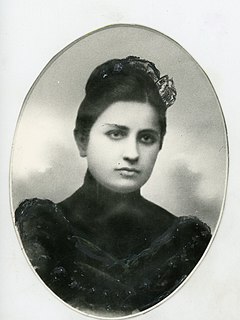
Ekaterine "Kato" Svanidze was the first wife of Joseph Stalin and the mother of his eldest son, Yakov.

The Armeno–Georgian War was a short border dispute fought in December 1918 between the newly independent Democratic Republic of Georgia and the First Republic of Armenia, largely over the control of former districts of Tiflis Governorate, in Borchaly (Lori) and Akhalkalaki.
Alexander Nevsky Cathedral may refer to the following :
Caucasus or Caucasia is a geographic region in Eurasia.
Abo or ABO may refer to:
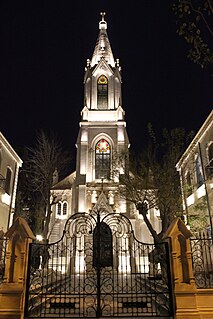
Caucasus Germans are part of the German minority in Russia and the Soviet Union. They migrated to the Caucasus largely in the first half of the 19th century and settled in the North Caucasus, Georgia, Azerbaijan, Armenia and the region of Kars. In 1941, the majority of them were subject to deportation to Central Asia and Siberia during Joseph Stalin's population transfer in the Soviet Union. After Stalin's death in 1953 and the beginning of the Khrushchev Thaw, the Caucasus Germans were allowed to return, though few did. Many assimilated and, after 1991, emigrated to Germany. Although the community today is a fraction of what it once was, many German buildings and churches are still extant, with some turned into museums.
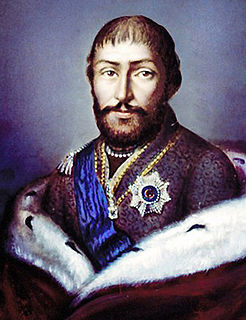
George XII, sometimes known as George XIII, of the House of Bagrationi, was the second and last King of the Kingdom of Kartli and Kakheti from 1798 until his death in 1800. His brief reign in the closing years of the 18th century was marked by significant political instability, which implied the near certainty of a civil strife and a Persian invasion. Weakened by poor health and overwhelmed by problems in his realm, George renewed a request of protection from Tsar Paul I of Russia. After his death, Imperial Russia took advantage of the moment and moved to annex the Georgian kingdoms, while sending the remnants of the Georgian royal family into forced exile in Russia.

Prince Grigol Orbeliani or Jambakur-Orbeliani was a Georgian Romanticist poet and general in Imperial Russian service. One of the most colorful figures in the 19th-century Georgian culture, Orbeliani is noted for his patriotic poetry, lamenting Georgia's lost past and independent monarchy. At the same time, he spent decades in the Russian military service, rising through ranks to highest positions in the imperial administration in the Caucasus.

The National Parliamentary Library of Georgia is a governmental organization under the Parliament of Georgia. It is the main book depository of Georgia, as well as the most important cultural, educational, scientific, informational and methodological centre.

Simon Arshaki Ter-Petrosian, better known by his nom de guerre of Kamo, was an Old Bolshevik revolutionary and an early companion to Soviet leader Joseph Stalin.

The Tiflis Governorate was one of the guberniyas of the Caucasus Viceroyalty of the Russian Empire with its centre in Tiflis. In 1897 it constituted 44,607 sq. kilometres in area and had a population of 1,051,032 inhabitants. The governorate bordered the Elisabethpol, Erivan, Kutais guberniyas, the Dagestan, Terek, and Kars oblasts, and the Zakataly Okrug. It covered the contemporary areas of southeastern Georgia, northern Armenia and northwestern Azerbaijan.
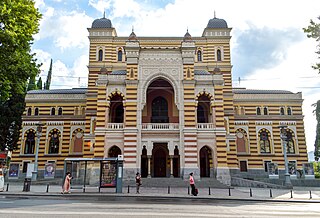
The Georgian National Opera and Ballet Theater of Tbilisi, formerly known as the Tiflis Imperial Theater, is an opera house situated on Rustaveli Avenue in Tbilisi, Georgia. Founded in 1851, Tbilisi Opera is the main opera house of Georgia and one of the oldest such establishments in Eastern Europe and Western Asia.
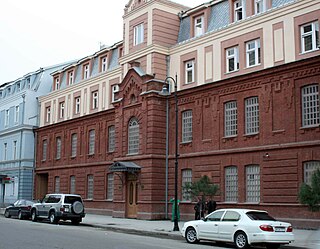
The Georgian coup in May 1920 was an unsuccessful attempt to take power by the Bolsheviks in the Democratic Republic of Georgia. Relying on the 11th Red Army of Soviet Russia operating in neighboring Azerbaijan, the Bolsheviks attempted to take control of a military school and government offices in the Georgian capital of Tiflis on May 3. The Georgian government suppressed the disorders in Tiflis and concentrated its forces to successfully block the advance of the Russian troops on the Azerbaijani-Georgian border. The Georgian resistance, combined with an uneasy war with Poland, persuaded the Red leadership to defer their plans for Georgia's Sovietization and recognize Georgia as an independent nation in the May 7 treaty of Moscow.
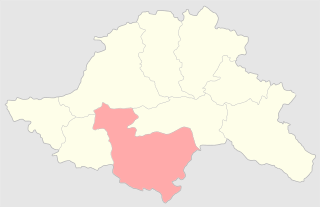
The Borchaly Uyezd was a county of the Tiflis Governorate of the Caucasus Viceroyalty of the Russian Empire and then of Democratic Republic of Georgia and of Democratic Republic of Armenia with its administrative center in Shulaveri. Now, it is part of the Armenia's region of Lori and Georgia's region of Kvemo Kartli.

The 1907 Tiflis bank robbery, also known as the Erivansky Square expropriation, was an armed robbery on 26 June 1907 in the city of Tiflis in the Tiflis Governorate in the Caucasus Viceroyalty of the Russian Empire. A bank cash shipment was stolen by Bolsheviks to fund their revolutionary activities. The robbers attacked a bank stagecoach, and the surrounding police and soldiers, using bombs and guns while the stagecoach was transporting money through Erivansky Square between the post office and the Tiflis branch of the State Bank of the Russian Empire. The attack killed forty people and injured fifty others, according to official archive documents. The robbers escaped with 241,000 rubles.

Besarion Ivanes dze Jughashvili, commonly known as Beso, was the father of Joseph Stalin. Born into a peasant family of serfs in Didi Lilo in Georgia, he moved to Tbilisi at a young age to be a shoemaker, working in a factory. He was invited to set up his own shop in Gori, where he met and married Ekaterine Geladze, with whom he had three sons; only the youngest, Ioseb, lived. Once known as a "clever and proud" man, Jughashvili's shop failed and he developed a serious drinking problem, wherefore he left his family and moved back to Tbilisi in 1884, working in a factory again. He had little contact with either his wife or son after that point, and little is known of his life from then on, except that he died in 1909 of cirrhosis.
Several steamships have borne the name Pfalz, after the Palatinate region in Germany:
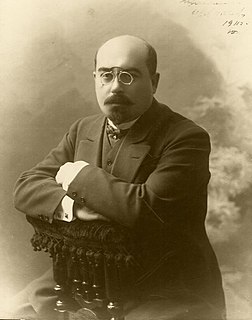
Alexander Khatisian was an Armenian politician and journalist.
The Muslim conquest of Azerbaijan was the military struggle that led to Azerbaijan's incorporation in the Islamic caliphate. In AD 643, after the conquest of Rayy and Central Persia, Umar ordered the conquest of Azarbaijan. The Rashidun Caliphate continued the conquest toward Azerbaijan first under the force of Al Mughirah bin Shubah. This was reported by Abu Jafar (Tabari), quoting the report from Ahmad bin Thabit al Razi.
The Arabic nisbah, an attributive title, al-Tiflisi or al-Taflisi denotes an origin from or association with the city of Tbilisi, Georgia.